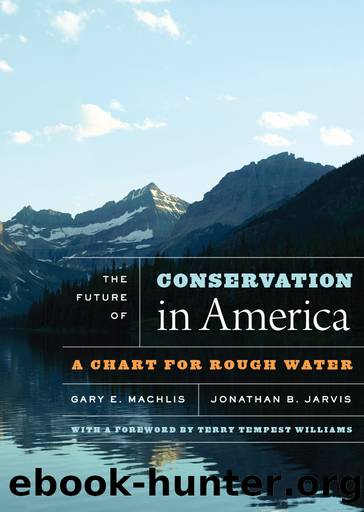The Future of Conservation in America by Gary E. Machlis;Jonathan B. Jarvis; & Jonathan B. Jarvis

Author:Gary E. Machlis;Jonathan B. Jarvis; & Jonathan B. Jarvis [Machlis, Gary E. & Jarvis, Jonathan B.]
Language: eng
Format: epub
Publisher: University of Chicago Press
Incorporate strategic intent and the long view into every action, conflict, or crisis
Every day there are events, media stories, court proceedings, environmental crises, political decisions, and individual and agency actions affecting the American landscape. While these individual occurrences may seem disconnected or episodic, each presents an opportunity to apply strategic intent to bolster the future of conservation. Too often, conservation advocacy organizations stumble from each defensive action to the next or tout singular achievements (however worthy), focusing on relatively short-term wins and losses. Incorporating strategic intent into conservation action is not simply the creation of a vision statement, annual plan, or other organizational device. These are certainly necessary, but what is crucial is the commitment to identify how each individual action in the present can contribute to conservation in the long view. The future of conservation requires that leaders devote skill, time, energy, and funds to well-planned and intentional actions for the long viewâactions that create critical momentum for future advances.
Every occurrence, however devastating, can present a juncture for action. Hurricanes can result in human and economic tragedy, yet their aftermath creates an opening for public conversations about using conservation practices (such as âgreen infrastructureâ) to mitigate future storms, sea level rise, and climate change. Popular writing on the scientific contributions of women and minorities (as recently chronicled in bestselling books and films such as The Immortal Life of Henrietta Lacks and Hidden Figures) reveal stories of discrimination that present fresh opportunities to build relevancy to new communities.5 Innovative experiments in public education provide openings to integrate field experiences and conservation into childhoods and to engage parents as well. Each conservation struggle regardless of outcome carries a lesson that needs to be analyzed carefully, told accurately, and shared without malice, so as to inspire advocacy for the next conflict that will surely arise.
Download
This site does not store any files on its server. We only index and link to content provided by other sites. Please contact the content providers to delete copyright contents if any and email us, we'll remove relevant links or contents immediately.
The Lonely City by Olivia Laing(4798)
Animal Frequency by Melissa Alvarez(4459)
All Creatures Great and Small by James Herriot(4311)
Walking by Henry David Thoreau(3952)
Exit West by Mohsin Hamid(3823)
Origin Story: A Big History of Everything by David Christian(3687)
COSMOS by Carl Sagan(3617)
How to Read Water: Clues and Patterns from Puddles to the Sea (Natural Navigation) by Tristan Gooley(3460)
Hedgerow by John Wright(3353)
How to Read Nature by Tristan Gooley(3335)
The Inner Life of Animals by Peter Wohlleben(3309)
How to Do Nothing by Jenny Odell(3293)
Project Animal Farm: An Accidental Journey into the Secret World of Farming and the Truth About Our Food by Sonia Faruqi(3212)
Origin Story by David Christian(3194)
Water by Ian Miller(3177)
A Forest Journey by John Perlin(3067)
The Plant Messiah by Carlos Magdalena(2926)
A Wilder Time by William E. Glassley(2858)
Forests: A Very Short Introduction by Jaboury Ghazoul(2836)
